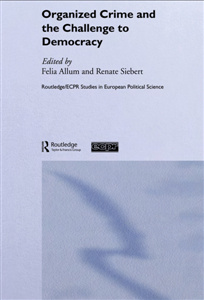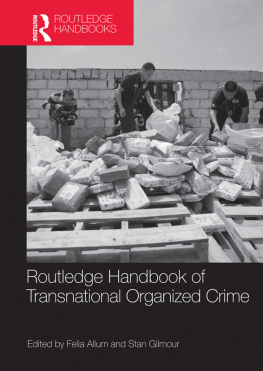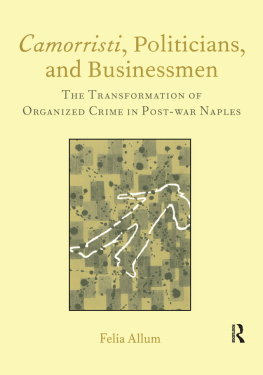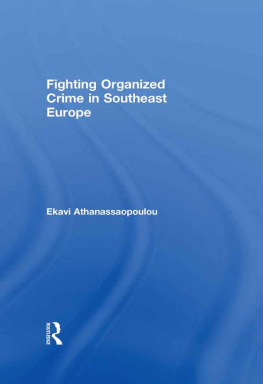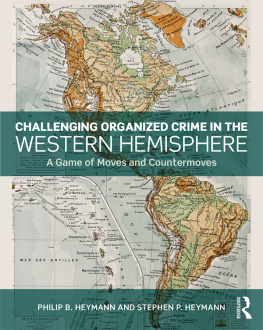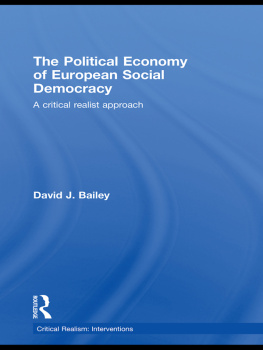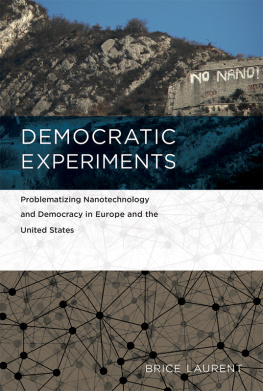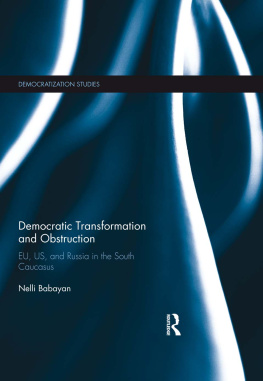Felia Allum - Organised Crime and the Challenge to Democracy
Here you can read online Felia Allum - Organised Crime and the Challenge to Democracy full text of the book (entire story) in english for free. Download pdf and epub, get meaning, cover and reviews about this ebook. year: 2003, publisher: Routledge, genre: Politics. Description of the work, (preface) as well as reviews are available. Best literature library LitArk.com created for fans of good reading and offers a wide selection of genres:
Romance novel
Science fiction
Adventure
Detective
Science
History
Home and family
Prose
Art
Politics
Computer
Non-fiction
Religion
Business
Children
Humor
Choose a favorite category and find really read worthwhile books. Enjoy immersion in the world of imagination, feel the emotions of the characters or learn something new for yourself, make an fascinating discovery.
- Book:Organised Crime and the Challenge to Democracy
- Author:
- Publisher:Routledge
- Genre:
- Year:2003
- Rating:4 / 5
- Favourites:Add to favourites
- Your mark:
- 80
- 1
- 2
- 3
- 4
- 5
Organised Crime and the Challenge to Democracy: summary, description and annotation
We offer to read an annotation, description, summary or preface (depends on what the author of the book "Organised Crime and the Challenge to Democracy" wrote himself). If you haven't found the necessary information about the book — write in the comments, we will try to find it.
Felia Allum: author's other books
Who wrote Organised Crime and the Challenge to Democracy? Find out the surname, the name of the author of the book and a list of all author's works by series.
Organised Crime and the Challenge to Democracy — read online for free the complete book (whole text) full work
Below is the text of the book, divided by pages. System saving the place of the last page read, allows you to conveniently read the book "Organised Crime and the Challenge to Democracy" online for free, without having to search again every time where you left off. Put a bookmark, and you can go to the page where you finished reading at any time.
Font size:
Interval:
Bookmark:
Acknowledgements
The editors are grateful to the ECPR, which provided the space within which this book was conceived, as well as the ECPR secretariat (Claire, Sandra and Rob), which works tirelessly to make that organization a success. We would like to thank all the contributors who survived the demands and pressures of the task, as well as Francesco Marelli and Bruce Baker who participated in our discussions in Grenoble. Special thanks go to David Beetham, Julia Molinari, Giap Parini, Peter Schneider, Federico Varese and the Polis Institute at the University of Leeds for their support. Last but not least, we are grateful to Stasha Lauria for his unflagging patience.
This book is dedicated to two special people in sign of love and respect.
Why is organized crime so successful?
Fabio Armao
The rate at which the mafia problem is exploding in an ever-growing number of countries, both developed and developing, challenges our understanding over and above our moral principles. We were used to thinking of organized crime as a marginal phenomenon and/or as the sign of closed social groups contrasting the flow of modernization. Now we must assume that criminal organizations act just as private holdings, produce huge profits, enter more and more marketsbecoming transnational without ever losing their main characteristic, which is the use of violence to conquer and defend their positions. But, first of all, what exactly do we mean by organized crime and, second, how is it possible that organized crime may succeed in challenging even modern democracies?
Organized crime: a genus with a plurality of species
As is well known, the expression organized crime was coined during Prohibition and legitimized by the Kefauver Commission on interstate criminal commerce in the United States in 1951 (Becchi 2000). The term emphasizes the economic aspects of the crime, its pursuit of illicit profits through group activity; and many have argued that the group has ethnic consistency, which implies that crime is an instrument of social advancement for underprivileged minorities (Abadinsky 1990). Lastly, in December 2000 this definition was adopted by the United Nations in its Convention Against Transnational Organized Crime: an Organized criminal group shall mean a structured group of three or more persons, existing for a period of time and acting in concert with the aim of committing one or more serious crimes or offences.in order to obtain, directly or indirectly, a financial or other material benefit (article 2). But such a definition proves to be oversimplistic because, by decontextualizing transnational organized crime from political and social reality, it impedes comprehension of its origins, and, in so doing, it conceals the fact that its competitiveness may also consist in a traditional network of collusive relationships with members of external (and licit) groups (social, political, entrepreneurial). Besides, it ignores significant differences among organizations, such as white-collar criminals, street gangs, mafia.
It might be useful, at least for social scientists if not for politicians and investigators, to consider and define organized crime as a genus, including many different species depending on the geopolitical and historical context. In other words, we may imagine a sort of continuum, starting from organized crime in the sense of a group of individuals
who act together to commit crimes of different types (such as robberies, drug pushing, etc.), even on a transnational basis; then moving on to crime syndicates as well-structured criminal groups with different hierarchical roles devoted to the search for profits, acting first of all as entrepreneurs; and finally at the other end of the continuum mafia, as the most specialized criminal group, also using politics (which means the totalitarian control of a territory) to obtain profits (see Figure 1.1).
Theoretically, of course, it is possible to move up or down the continuum; thus it is not necessary that all organized crime groups evolve into mafia, and even mafia groups may be able to cut their links with political systems and become more involved in business activities (just like criminal entrepreneurs). Empirically, which means historically, things are much more complex. First, to study transnational organized crime it is necessary to effect a sort of methodological revolution, adopting at least some of the assumptions about multidisciplinarity and multilevel analysis on which social scientists theorize, while at the same time looking at these assumptions as if they were utopian goals. Organized crime is probably the best case study to test this method. A grid to organize the many different variables would be needed and it would also be necessary to collect empirical data, to obtain ever more information on different organizations: their structures, businesses, relationships with the political systems, and so on. But the last point is still, paradoxically, the most difficult one: many governments are reluctant to inform us about the true extent of the phenomenon inside their borders and tend to interpret requests for data and information, even from international institutions, as a gross violation of their sovereignty.
However, if we had sufficient facts we could test a number of hypotheses. Maybe in certain circumstances a sort of natural trend exists and the mafia is the point of arrival, a necessary evolution of organized crime groupsa confirmation of this trend being the growing number of so called mafia states around the world. Or, on the other hand, a criminal group may halt its evolution at the level of a crime syndicate. Probably, however, a sort of a law of no return exists: if an organized crime group has developed links with elements of the political system, why should it give up this advantage? If this assumption is true, then those who argue that the mafia can evolve into a purely legal enterprizeand that this is why societies must ultimately learn to coexist with themare either mistaken or lying.
Organiio cnimo Crime syndics'!* Maria
Figure 1.1The continuum of organized crime.
As regards the second questionhow is it possible that organized crime may succeed in challenging even modern democracies?the simplest way to answer this is to analyse organized crime groups as if they were systems with their own authorities, regimes and structures (Armao 2000). And each of these systems, as such, interacts with its environment, consisting of other (sub) systems, such as the political, the juridical, the economical or the social (Allum 2000). What matters, from this perspective, is that the interaction among the systems is a necessity because they are not autonomous and their borders are not impermeable. The area of true interaction between criminals and, for example, politicians is a grey zone which would be useful to analyse in scientific terms. The strength of a criminal group depends on its capacity to develop a network of relationships with members of other systemsentrepreneurs, politicians, and so on which for convenience may be defined as the chance to obtain illicit advantages in defeating competitors (for example, both in the market, securing contracts, and in the political arena, buying votes) and attaining monopoly positions. This model of analysis fits mainly the peculiarities of mafia groups, which are therefore the most dangerous for democracywhich is why I will devote my analysis to this species.
Mafia, as is universally known, is an Italian term; it identifies a criminal association specific to western Sicily, whose main characteristic is exactly its political nature (Pezzino 1994), in the Weberian sense: it aims to obtain a monopoly of physical force within a territory as a guarantee of its own system. The function of this monopoly is to accumulate resources to invest in illicit markets, but also to gain the consent necessary to infiltrate legitimate society. The term mafia, then, may be used to identify a peculiar model of criminal behaviour much more complex than that of simple organized crime, and which equates, to give some examples, with Cosa Nostra, Camorra and Ndrangheta, but also with the Japanese Yakuza and the Chinese Triadsnot implying that all these organizations are identical, but that these and other criminal groups have similar structures and functions.
Next pageFont size:
Interval:
Bookmark:
Similar books «Organised Crime and the Challenge to Democracy»
Look at similar books to Organised Crime and the Challenge to Democracy. We have selected literature similar in name and meaning in the hope of providing readers with more options to find new, interesting, not yet read works.
Discussion, reviews of the book Organised Crime and the Challenge to Democracy and just readers' own opinions. Leave your comments, write what you think about the work, its meaning or the main characters. Specify what exactly you liked and what you didn't like, and why you think so.

